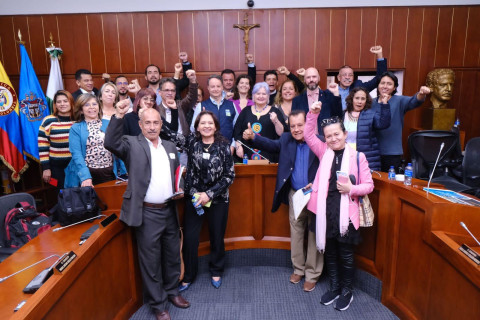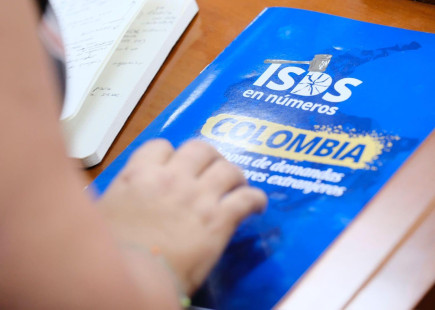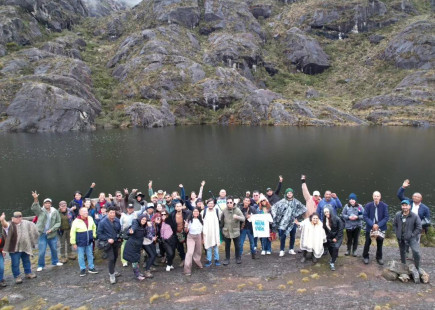Ideas into movement
Boost TNI's work
50 years. Hundreds of social struggles. Countless ideas turned into movement.
Support us as we celebrate our 50th anniversary in 2024.

In May 2023, the Transnational Institute (TNI) participated in an international delegation composed of researchers and human rights organizations to identify and systematize allegations of transnational abuses in Colombia.

TNI
When we say yes to water, no to gold, we are saying yes to life, no to death, because transnational corporations leave death.

TNI
Two arbitration claims being faced by the Colombian state are related to Constitutional Court decisions and actions taken by the state to protect water sources and communities affected by mining projects. The multinational Glencore, owner of the Cerrejón coal mine (the largest open-pit mine in Latin America), is seeking millions in compensation from the State due to a ruling that protects the Bruno stream. Likewise, the Canadian mining company EcoOro has filed a lawsuit for 736 million dollars against the Colombian State for halting the gold extraction megaproject in the Páramos de Santurbán, an enclave for the global ecosystem that, thanks to popular mobilization, remains alive. However, ignoring the environmental damages, the arbitration tribunal has ruled in favor of the investor, the final amount that EcoOro will receive has not yet been disclosed.
By the end of March of this year, eight of the twenty-one claims against Colombia had been resolved, while thirteen are still pending. Of the settled claims, five were not favorable to the investor. Surprisingly, Glencore has initiated three arbitration claims and three others are in the pre-arbitration phase, putting significant pressure on the government. In the lawsuit initiated by Glencore in 2016, the tribunal ruled in favor of the investor and ordered Colombia to pay US$19 million. The million-dollar figures demanded by each of the transnational companies from the Colombian state affect the public budget and directly attack the country's ability to regulate the activity of foreign investors.
The arrival of the international delegation to the different territories affected by the demands of transnational corporations made it possible to make visible and demonstrate the negative impacts of free trade agreements and investment agreements. Within the framework of the visit, various meetings were held with representatives of civil society to share tools and positive experiences in denouncing or reviewing investment agreements. At the same time, meetings were held with governmental authorities to discuss agreements and actions that should be taken. Lucía Bárcena, TNI researcher, stated that "during the visit to La Guajira we were able to verify that Glencore Mining is not only not complying with the Constitutional Court's ruling by continuing to expand its extractive activity, but is also using investment arbitration to pressure the Colombian government. The investment arbitration is protecting the fossil fuel industry, instead of holding them accountable for the environmental damage they have caused".
On May 31, a meeting was held in the Second Commission of the Colombian Senate. On this occasion, international experts and local organizations of affected communities had the opportunity to express their demands.
Luis Jesús Gamboa, representative of the Committee for the Defense of Water and the Santurbán Páramo, said that reviewing the investment agreements is a matter of utmost importance for "the fate of the Santurbán páramo, for Colombia's páramos, and for water, which is life". "The multinational companies that have come to the country as a result of free trade agreements and investment treaties have settled in the Santurbán páramo and have provoked demands such as the one we have today from EcoOro. This multinational has left, but within the framework of the treaty it has demanded 700 million dollars from the state, because the communities settled in the territory did not allow this mining extraction project to go ahead, with consequences for the national treasury". Gamboa stated the need to review the free trade and investment treaties and requested the support of the Commission to "join forces to defend the Colombian State against this perverse mechanism that affects health and education finances".
Cindy Forero, lawyer of the José Alvear Restrepo Lawyers Collective (CAJAR) raised her concern about the non-compliance with the sentence suspending the Cerrejón project, due to the violation of the rights to health, food sovereignty and life of the communities affected by this project. The lawyer argued that the Swiss company Glencore took advantage of the Constitutional Court ruling that ordered the halt of the exploitation in the Tajo la Puente, an area that directly affects the Bruno stream in the heart of the Wayúu communities of La Guajira, to sue Colombia for an amount that is still unknown. Forero explained that these actions put at risk the judicial independence and sovereignty of the Colombian State. She added that "it is not possible that a multinational company disregards fundamental rights and the sovereignty and autonomy of the high courts and pretends to sue the Colombian State for making decisions regarding the protection of human rights". The lawyer stated that the company is contaminating and displacing indigenous communities: "The Wayúu community demands that the Wayúu normative system be respected", she assured. In summary, for the lawyer and human rights defender "the Colombian State is renouncing to defend fundamental human rights because the companies have the power to sue and leave us without resources".
TNI researcher Luciana Ghiotto explained that the ISDS system will be a problem for any government that wants to fight for the defense of human, environmental and labor rights. Although it is a complex situation, for the researcher there are many actions and responses that can be implemented by governments and, along these lines, she mentioned some of the capacities that the Colombian Senate has in relation to this issue. Ghiotto said that during the meetings held within the framework of the international delegation, the government's intention to review the FTAs and BITs was mentioned, but she called attention to the risk of taking a superficial look at the modifications required by these agreements. The researcher stated that senators have the capacity to intervene in the negotiation, renegotiation and approval of new treaties and in this sense she called on the Colombian Senate "not to approve new free trade or investment treaties and to support and promote bills for Colombia's withdrawal from ICSID". To conclude, she proposed that Colombia "protect itself in the future so as not to fall into these types of treaties again, that is why we propose no more investment treaties, not to approve the treaty with the United Arab Emirates" and she asked the Senate to promote Colombia's exit from the Energy Charter Treaty. "We fervently believe that this House has the power and the responsibility to ask for the revision of these treaties and to ask for a comprehensive audit of these treaties," said Ghiotto at the end of her speech. Assuming this responsibility, for the researcher, will allow informing the Colombian people "what have been the integral impacts of these treaties, both in economic sectors such as agriculture, the sector of small and medium enterprises, but also the impacts on access to health, medicines, drinking water, access to education, and of course also the environmental impacts and on women," she said.
Among the points requested of the Colombian government by more than 300 national and international organizations is the request for a comprehensive review of the Investment Agreements and Free Trade Agreements that contain the Investor-State Dispute Settlement (ISDS) mechanism, in order to urgently denounce, renegotiate or terminate all existing international investment agreements. With this action, according to the international mission, "it is possible to rescue the sovereignty of the State to regulate in the interest of the environment and the Colombian people, to defend the independence and role of the judicial system, and to respect the self-determination of indigenous peoples and other communities seeking justice and accountability for environmental damages and violations of their rights".1

TNI
Additionally, they requested that the Colombian State denounce the ICSID Convention, a multilateral treaty formulated by the World Bank to promote international investment. In this context, the use of national justice as a tool for the resolution of disputes between investors and the State was emphasized. Likewise, they demanded that no new treaties with investment protection clauses and ISDS mechanisms be signed. For the international delegation "the Government's efforts should focus on creating binding mechanisms for corporate accountability and responsibility, strengthening obligations for closure plans, environmental restoration and comprehensive reparations for victims of corporate abuses by transnationals".2
In this sense, if the current government of Colombia is presented as a "World Power for life", they remarked that it should be capable of leading the negotiation of the Binding Treaty on Business and Human Rights at the UN. In this context, it was requested that the government "oblige transnational corporations to be accountable for their impacts on the territories and to repair the damages they cause, in accordance with the proposals of the indigenous peoples, Afro-descendants and peasant communities to decide on their territories".